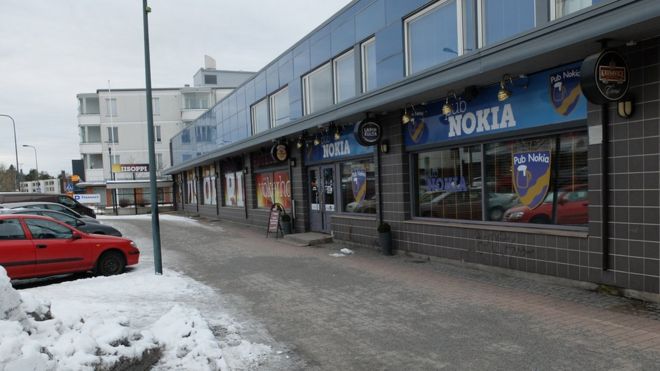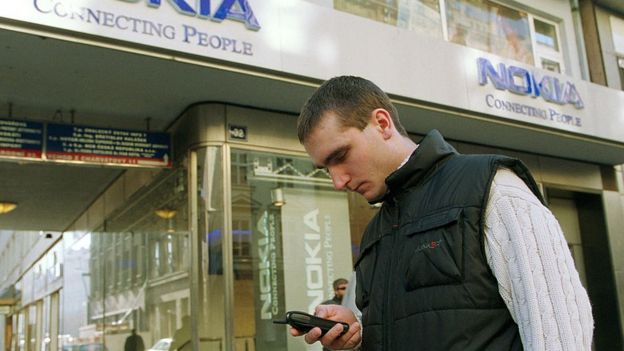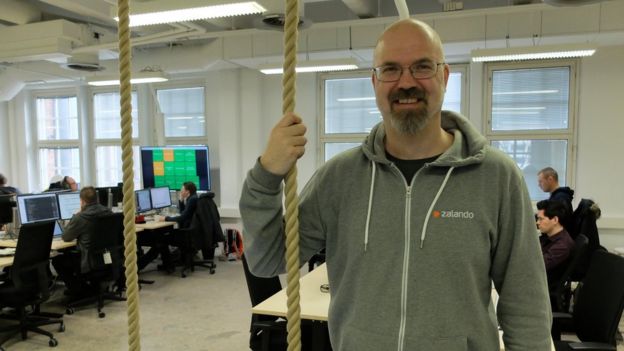- 18 March 2016
- Business

On the face of it the small Finnish town of Nokia looks wholly unremarkable. A few squat blocks of flats are nestled in the winter snow, and along the heavily gritted main road is a small strip of shops, restaurants and a discount supermarket.
There's little sign that this quiet backwater once gave its name to the company that revolutionised the mobile phone industry in the late 1990s and helped turn Finland's economy into one of the most prosperous in the world.
At its peak in the early 2000s Nokia supplied 40% of the world's mobile phones, creating Finland's first globally recognised consumer brand.
At home its impact was even greater. According to the Research Institute of the Finnish Economy it contributed a quarter of Finland's growth between 1998 and 2007 - a period Finnish finance minister Alexander Stubb calls an "economic miracle".
 Getty Images
Getty Images
But as quickly as it emerged, Nokia's dominance of the mobile phone market came crashing down, hitting Finland's economy hard and coinciding with the longest recession in the country's history.
"Nokia was huge in Finland by all indicators, and when that was scaled down we were horrified about the possible consequences," says Kari Kankaala, director of economic and urban development for the city of Tampere.
'Backbone of everything'
Tampere is about 15 minutes down the road from the town of Nokia, and the site of the company's biggest research and development site, at its peak employing 4,000 high-tech, skilled workers.
The city's old redbrick smokestacks tell the story of its 19th Century industrial past, but the rise and fall of Nokia's mobile phone business has dominated its more recent history.
"It was the backbone of everything here," says Mr Kankaala. "The universities relied on collaboration with Nokia, the subcontractors depended on Nokia, the kids relied on being employed by Nokia."

"Now we have an horrendous unemployment situation of the order of 14-15%."
Other high-tech firms have since moved in to fill the void. And Nokia's separate networks business, focusing on telecoms infrastructure, remains a successful Finnish enterprise. But a wider economic malaise in Finland means fewer people are hiring now.
In Tampere former Nokia employees still ponder how the company went from world leader in mobile phones as recently as 2007 to the struggling takeover target for Microsoft in 2014.
"I think one of the high points was when we'd shrunk the mobile phones smaller than Motorola," says Mika Grundstrom, a former senior manager at Nokia's R&D site in Tampere. "That was around 1997-1998. It was kind of an engineering dream."
The iPhone effect
For Mika the brief in the early days was simple - make the phone with the best battery life in the smallest case possible.

But then all that changed with the rise of the smartphone, and in particular the launch of Apple's iPhone in 2007.
"Things became much more complex. We were not so sure anymore what we should actually target. Is it ease of use, is it battery life, is it size?" he says.
"If you think about the battery life - we had devices that could last for a week. Then you have this new device, it's excellent but you need to charge it every day. Ok so how do you actually sell that to the customer?"
Nokia played catch-up in the smartphone market until 2014, when its mobile phone business was sold to Microsoft and the Nokia name was removed from its devices altogether.
But despite its effective demise, many Finns say there is a positive legacy to appreciate.
"Giving Nokia shares to workers made it accepted that your next door neighbour could be a millionaire," says Kari Kankaala. He says Nokia's biggest impact was to revolutionise Finland's business culture.
"That acceptance that someone can actually make money, combined with the new approach to entrepreneurship - that was a major change."
Start-up legacy
Two hours to the south in Helsinki there are already signs of that new business culture taking hold in the post-Nokia world.

Tuomas Kytomaa is a software engineer who spent most of his career working for Nokia, including stints in the US and Germany.
Last year he returned to Finland to work for the online retailer Zalando and set up a tech hub on the site of an old cable factory in the Finnish capital, now converted into trendy office space.
For him Nokia's legacy is a wealth of talent and expertise waiting to be tapped.
"The talent hasn't really gone anywhere," he says. "The sheer magnitude of Nokia in Finland means that there's a pool of tech talent that has deep specialised knowledge."
"Finland's buzzing with high-tech skills and start-ups."
Whatever the future of Finland's tech industry, few believe that a company of Nokia's size and influence will appear again.
"When Nokia was a dominant player in this business, there were a lot of good things that happened in Finland," says Seppo Haataja, another former manager at Nokia's research and development site.
"Now the situation is changing. the innovations are not coming through the big companies - it's small companies, the start ups."
Listen to Business Daily on BBC World Service or download the podcast here.

No comments:
Post a Comment